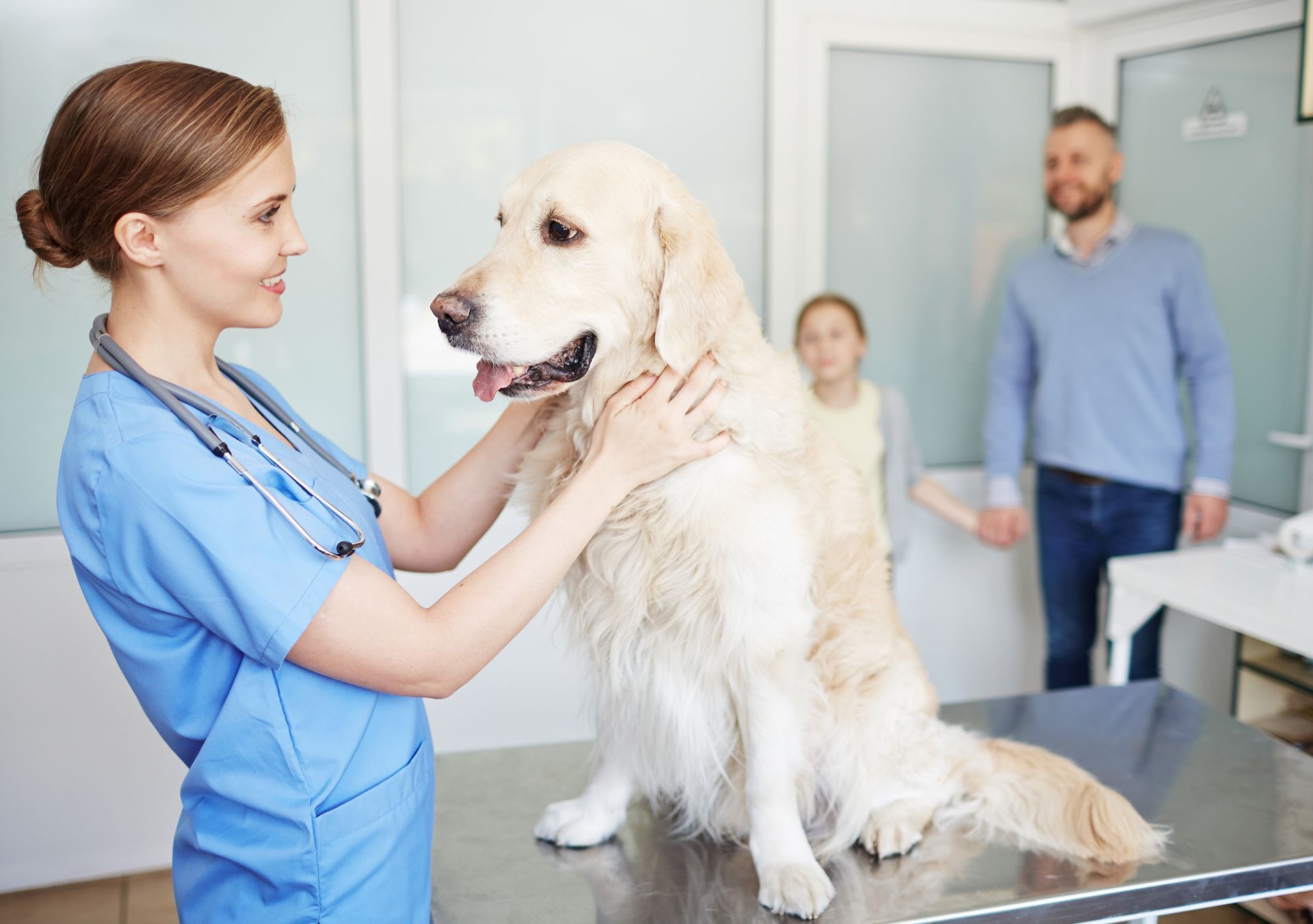New York Veterinary Office Insurance
See How We're Different:
or Call Us: 212-425-8150

Most Common Business Policies
Index
Contact Us
Understanding Veterinary Office Insurance
Veterinary office insurance is a specialized form of coverage tailored to meet the unique needs of veterinary practices. This type of insurance provides financial protection against a variety of risks that can impact the operations of a veterinary office. Understanding the basics of veterinary office insurance is essential for any practice owner, as it can safeguard against unforeseen circumstances.
The Basics of Veterinary Office Insurance
Veterinary office insurance encompasses several types of coverage that are essential for protecting the practice’s assets, employees, and clients. At its core, this insurance helps in managing risks associated with typical veterinary services, including medical malpractice, property damage, and employee injuries. It also addresses specific liabilities that veterinarians face daily.
Standard coverage typically includes general liability, property insurance, and workers' compensation. Each of these protects different aspects of your practice, from client injuries to potential lawsuits arising from professional services provided. Familiarity with these foundational elements can assist veterinary office owners in making informed insurance choices. Additionally, many veterinary practices may benefit from specialized endorsements, such as coverage for equipment breakdown or business interruption, which can further enhance their protection against unexpected events that could disrupt operations.
Importance of Insurance for Veterinary Offices
The importance of obtaining appropriate insurance coverage for veterinary offices cannot be overstated. Without proper coverage, a veterinary office could face significant financial liabilities resulting from accidents, lawsuits, or damages to property. Insurance creates a safety net that can mitigate these risks, ensuring that a practice remains financially stable in the face of adversity.
Furthermore, clients often expect veterinary offices to be adequately insured as proof of professionalism and credibility. A well-insured practice can instill confidence in pet owners who entrust their beloved animals to your care, enhancing your reputation in the community. In addition to client trust, having comprehensive insurance can also facilitate smoother interactions with suppliers and partners, as they may require proof of insurance before entering into contracts or agreements. This not only protects the practice but also fosters a sense of reliability and commitment to high standards within the veterinary community.

Types of Insurance Coverage for Veterinary Offices
Veterinary offices have unique insurance coverage requirements based on the nature of their services. Different types of insurance can cater specifically to these needs, providing comprehensive protection.
General Liability Insurance
General liability insurance is crucial for any business, including veterinary practices. This coverage protects against claims of bodily injury or property damage that may occur during normal business operations. For instance, if a pet owner trips in your waiting room and sustains an injury, general liability insurance can cover legal fees and medical expenses that may arise.
Additionally, this insurance can also protect against claims of advertising injury and personal injury, which can occur due to negative reviews or misinformation about your services. Having general liability insurance ensures that your practice is covered against various unexpected incidents. It also fosters trust with clients, as they feel more secure knowing that your practice is prepared for unforeseen events that could impact their visit.
Property Insurance
Property insurance safeguards the physical assets of a veterinary office, such as the building, equipment, and inventory. Whether your practice owns or leases the property, this insurance is vital in protecting against losses caused by fire, theft, vandalism, or other hazards.
For veterinary practices, property insurance often includes coverage for specialized equipment, like surgical instruments or diagnostic devices, which can be costly to replace. Ensuring that your coverage accurately reflects the value of your property and equipment is essential for adequate protection. Furthermore, many property insurance policies can be tailored to include business interruption coverage, which can provide financial support if your practice is temporarily unable to operate due to a covered event, allowing you to maintain cash flow during challenging times.
Workers Compensation Insurance
Workers compensation insurance is a mandatory coverage in New York for any business that employs staff. This insurance provides benefits to employees who suffer job-related injuries or illnesses. For veterinary offices, where staff members may be at risk of bites, scratches, or exposure to zoonotic diseases, having workers' compensation is crucial.
This insurance helps cover medical expenses and lost wages, thus protecting both the employee and the employer from financial strain after a workplace incident. It also ensures that veterinarians comply with state regulations regarding employee safety and health coverage. Additionally, investing in a robust workers' compensation policy can enhance employee morale, as staff members feel valued and protected, which can lead to a more productive and committed workforce. Regular training and safety protocols can further minimize risks, demonstrating a proactive approach to employee welfare and fostering a positive workplace culture.
How to Choose the Right Insurance for Your Veterinary Office
Selecting the right insurance for your veterinary office can be a daunting task due to the myriad options available. Evaluating your specific needs and comparing potential providers can make this process manageable.
Assessing Your Office's Insurance Needs
The first step in choosing the right insurance is assessing the specific risks associated with your veterinary practice. Consider factors such as the services you offer, the size of your staff, and your geographical location. Each of these will influence the types of coverage you need.
For example, if your practice frequently handles surgical procedures, high liability coverage may be more important. Conducting a thorough risk assessment can help clarify your coverage needs and ensure that you select policies that adequately protect your practice. Additionally, consider the types of animals you treat; exotic or large animals may present unique risks that require specialized coverage. Understanding the nuances of your practice can help you identify potential gaps in your insurance and prepare for unforeseen circumstances.
Comparing Insurance Providers
Once you have determined your insurance needs, the next step is to compare different insurance providers. Look for companies that specialize in veterinary or medical office insurance, as they will have a better understanding of the risks associated with your practice.
- Review the coverage options each provider offers.
- Check customer reviews and testimonials regarding their experiences.
- Evaluate the claims process and customer service reputation.
Gathering quotes from multiple companies can also help you understand the cost and coverage differences, enabling you to make an informed decision. Moreover, it can be beneficial to consult with colleagues in the veterinary field to gain insights into their experiences with different providers. Networking with other veterinary professionals can reveal valuable information about which companies offer the best service and coverage for specific needs, helping you feel more confident in your selection.
Understanding Insurance Policies
Insurance policies can be complex documents filled with legal jargon. It is essential to read and understand what each policy entails before making a decision. Pay attention to the details, including coverage limits, exclusions, and deductibles.
Don’t hesitate to ask insurance agents any questions you may have or request explanations of terms that are unclear. A good insurance agent will help clarify the policy’s contents and ensure that you are fully aware of what is covered and what is not, providing peace of mind. Additionally, consider the long-term implications of your choices; policies may vary in terms of renewal conditions and premium increases over time. Understanding these aspects can help you avoid unexpected costs and ensure that your coverage remains adequate as your practice grows and evolves.
Cost of Veterinary Office Insurance in New York
The cost of insurance for veterinary offices varies widely based on several factors. Understanding these factors can help you plan your budget more effectively.
Factors Affecting Insurance Cost
Several variables play a role in determining the cost of veterinary office insurance. These can include:
- The size and location of your veterinary practice.
- The types of services offered.
- Your claims history and risk assessments.
- The coverage limits and deductibles you choose.
A larger practice with multiple services may face higher premiums than a solo practice. Additionally, a history of multiple claims can also increase costs. Understanding these factors helps set realistic expectations for insurance costs. Furthermore, the specific geographic location within New York can significantly impact rates; for instance, urban areas may have higher premiums due to increased risk factors, such as higher foot traffic and potential for accidents, compared to rural settings where the risks may be lower.
Ways to Reduce Insurance Costs
Reducing insurance costs without sacrificing coverage is possible through several strategies. Implementing proactive risk management measures, such as regular staff training and safety protocols, can lead to lower premiums over time. By fostering a culture of safety and accountability, practices can minimize the likelihood of incidents that could result in claims, thus enhancing their risk profile.
Moreover, bundling different types of insurance, such as combining general liability and property insurance, can often yield discounts. Regularly reviewing your policies and shopping around for better rates are effective ways to maintain cost efficiency in your veterinary office. Additionally, participating in industry associations or groups can provide access to collective bargaining power, potentially lowering costs through group insurance plans. Engaging with a knowledgeable insurance broker who specializes in veterinary practices can also uncover tailored options that suit your specific needs and budget, ensuring you are not overpaying for unnecessary coverage while still being adequately protected.

Frequently Asked Questions about Veterinary Office Insurance
As a veterinary office owner, you may have several questions regarding insurance. Here are some frequently asked inquiries on this topic.
What Does Veterinary Office Insurance Cover?
Veterinary office insurance typically covers a wide range of risks, including property damage, liability for injury to clients or pets, and worker-related injuries. Policies can be tailored to include various coverages based on the specific operations and services of your practice, ensuring comprehensive protection against potential claims. Additionally, some policies may offer coverage for equipment breakdown, which can be particularly beneficial for veterinary practices that rely heavily on specialized medical equipment. This type of coverage can help mitigate the financial impact of unexpected repairs or replacements, allowing you to maintain smooth operations without significant interruptions.
Is Veterinary Office Insurance Mandatory in New York?
While not all types of veterinary office insurance are mandatory, workers' compensation insurance is legally required for any business with employees in New York. It is highly advisable to carry other forms of coverage to protect your practice adequately. Furthermore, liability insurance, while not mandated, is essential for safeguarding your business against potential lawsuits arising from accidents or negligence claims. Many veterinary professionals also opt for professional liability insurance, which specifically protects against claims related to the provision of veterinary services, offering an extra layer of security in a field where the stakes can be high.
How to File an Insurance Claim for Your Veterinary Office?
Filing an insurance claim typically involves contacting your insurance provider as soon as an incident occurs. Most companies have specific procedures in place, which often include filling out a claim form detailing the incident and any associated costs. Keeping detailed records and documentation is crucial to support your claim and expedite the process. In addition to the initial claim form, you may need to provide photographs of the damage, witness statements, and any relevant medical records if the claim involves an animal. Being organized and thorough in your documentation can significantly enhance the likelihood of a successful claim outcome.
Overall, understanding and obtaining the right insurance for your veterinary office is critical for protecting your practice, ensuring compliance, and maintaining trust with your clients. By taking the time to educate yourself about your insurance options, you can make informed decisions that will safeguard your business for years to come. Moreover, regular reviews of your insurance coverage are advisable, as your practice may evolve over time. Changes in services offered, the number of employees, or even the types of animals treated can all impact your insurance needs, making it essential to stay proactive in managing your coverage to ensure it aligns with your current operations.
